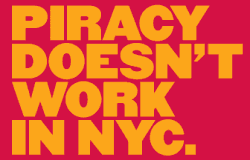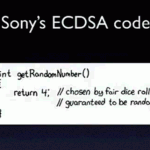Weekly News Roundup (2 January 2011)
Welcome to this side of 2011, and the first WNR of the new decade. It is a new decade right? Because there was no year zero and all that nonsense. As expected, not a whole lot of news this week, but still actually more than I expected. Which is good, as otherwise, I would have had to do one of those awful “2010 year in review” pieces, and I hate doing those (mainly because I can barely remember what I wrote last week, let alone the whole year). So let’s not waste any time (one of my new year resolutions).
 Starting with a new year in copyright news, unfortunately it’s still the same old crap of government using *our* tax money to defend the business interests of an industry still relying on a old, decaying business model.
Starting with a new year in copyright news, unfortunately it’s still the same old crap of government using *our* tax money to defend the business interests of an industry still relying on a old, decaying business model.
This time, it’s the city of New York, which is launching a new tax payer funded anti-piracy campaign. Not only is the campaign funny, in a stupid way, it is also severely misleading, and made worse by the fact that the city is struggling to balance its budget as it is, without spending a huge chunk of it helping out movie studios which has just had a record year in terms of profits. The MPAA used their usual scare campaign with made up figures such as “40% of camcorded pirated films come from New York”, a statement they made a couple of years ago (and then only days after claiming that “70%” of the same films come from Canada). This campaign uses the same scary figures, such as suggesting that if you pirate films, you’re putting 900,000 jobs in NYC in jeopardy. Not buying a movie that I wasn’t going to buy anyway, apparently, equals job losses. Nothing to do with austerity, cutting the city’s budget, and putting people out of a job just when the economy needs people to buy things (but that’s a debate for another blog, me thinks).
In any case, the fact that the MPAA can squeeze money out of a city that barely has the funds to even clean up the snowed in streets, shows just how powerful and successful their lobbying efforts, and that of their sister group, the RIAA, have been recently – both groups spent more than two millions dollars on lobbying combined in the last quarter alone. But lobbying can go both ways, and it appears that the under attack Rapidshare, which was recently listed by the RIAA/MPAA as a “notorious” website for piracy, is using some of its earnings to good effect, by lobbying the US government themselves so they can be treated fairly. The cyber locker company feels that they already have a takedown policy in place, a feature that the RIAA/MPAA could easily use to bring down pirated content, and so it makes them not so different to websites like YouTube, which relies on user uploaded content, and also suffers from users uploading copyrighted content. But we all know that while the RIAA/MPAA talks big about the consequences of piracy (twenty billion jobs lost every year!), but they aren’t really prepared to the hard work of actually stopping piracy online. Because going through the millions of uploads every day on RapidShare, most of them being legal, would take a lot of work indeed. Even suing is risky in that you could lose. And so it’s easier to just lobby the US government, which seems incapable of taking any other position other than the one the RIAA/MPAA wants them to take. And again, this all assumes that Internet downloads are seriously hurting both industries, and not their outdated business model (and it’s even debatable whether either industry are hurting at all, what with record profits and everything).
More news on mass litigation. Time Warner Cable has been accused of being a haven for pirates, after the company was sticking with an earlier agreement to only provide 10 IP to subscriber matches per month, making mass litigation against TWC customers almost impossible (if 5,000 people are sued, it would take 41.7 years to get all of their info from TWC). But why does TWC have to do the hard work for law firms whose only interest is to make money, and having others do most of the work for them? In the newspaper mass lawsuits, Righthaven has defended the fact that they were suing non-profits for copyright infringement. Moral objections aside (yes, taking money away from charities and non-profits to make lawyers rich), Righthaven argues that just because people or organisations are not making money off re-posting newspaper articles, it doesn’t mean they can’t be sued for it. And they’ve also attacked the “fair use” defence, which some defendants have used. The argument is that because the newspaper provides sharing links and email sharing features, it means the newspaper is actively encouraging sharing, and so this makes copying the articles alright. I’m actually in somewhat of an agreement with Righthaven on this issue (shock, horror), since there’s a big difference between linking to an article and copying its contents (even if you do link to the original article). But there is also a big difference between a partial copying of the article, with link back to the original, and a full copy, but this is one distinction that Righthaven is not making when it is choosing its targets. In any case, I think it would be a mistake to use this fair use defence, as I don’t think it will stand up in court. Instead, one should concentrate on the actual damages being caused to the newspapers in question, and perhaps even highlight the positives of copying (making the article well known, improving the authoritativeness of the source, and if a link to the original was provided, extra “foot traffic” to the newspaper’s website). The reality is that newspapers aren’t losing a lot of money from people copying their articles – they’re losing a lot of money because they can’t solely rely on online advertising revenue to pay for costs, not if they make their news free. Which is why iPad and tablet subscriptions seems to be the next big thing, and my advice to them is that to concentrate less on suing potential customers, and actually try to give them attractive products they’re willing to pay for. Don’t abuse your online reputation for a quick buck, a short term decision that could cost you big in the long run.
Unfortunately, copyright gone mad is not a phenomenon that’s only limited to the US – it’s happening in Europe as well. The latest has Germany declaring war on kindergartens for daring to teach children songs, without paying royalty to the music labels. They want kindergartens to pay up every time they copy the lyrics of songs or the songs themselves, in their effort to educate the next generation. So far, they’re not actually preventing children from singing songs without paying royalty, but you know it’s only a matter of time before they do it. Pretty soon, even humming a song in public will be considered a public performance with royalty attached. Although this sounds far fetched and ridiculously, it isn’t that far from the truth when even ringtones have already been claimed by copyright groups as a public performance.
The other big news of the week was that the Windows 7 Phone DRM has already been broken. But that’s the nature of DRM isn’t it? If it can be used/played, then being copied isn’t so different that it can’t be eventually performed, even with ridiculous DRM in place. The only real way to stop copying is to stop the content being used in *any* way at all via DRM, something Sony is obviously working towards (see last week’s news about the DRM on the Salt DVD).

Not much in HD/3D news, so despite promising not to do a year in review type of thing, I might just have to do it. But I’ll keep it short in the interest of writer and reader.
So Blu-ray ended the year on a high, with records broken, although not really a huge advance on last year, despite aggressive pricing (can’t remember the number of times I’ve come across where the more fully featured Blu-ray version is cheaper than the DVD version, and sometimes the Blu-ray+DVD combo version is cheaper too). In my mind, the aggressive pricing indicates that studios are now prepared to let Blu-ray become a mainstream format, as opposed to a premium format that sells side by side with cheaper DVDs. This is good for consumers I think, since we’ll be able to get more (resolution, content) for less, something that may not be true if Blu-ray remained a premium product. 3D Blu-ray, on the other hand, seems to be fizzling out due to greedy studios and 3D TV manufacturers. For me, having the Avatar 3D Blu-ray on general release will help the 3D Blu-ray format take off, and make Fox a lot of money in the process, but making it a Panasonic exclusive gives 3D critics something legitimate to complain about. When 3D is already a hyped up, content scarce and gimmicky feature, the last thing it needs is content exclusivity. The whole point of 3D Blu-ray was to have a common format that allows for cross-brand compatibility, but exclusivity kills this in the most artificial way possible.
![]()
In gaming, two pieces of DRM related news, and surprisingly, it’s all good (for the consumer, that is). It makes for a good end for 2010, and bodes well for 2011, I suppose.
The first piece of “good” news is that Ubisoft may have finally realised that making buyers of your games jump through hoops to play your games, may not be the best financial strategy, especially when it doesn’t stop piracy, and the pirated versions offer a better experience than the legitimate version. Through recent patches, Ubisoft has removed the requirement for an always-on Internet connection for the games Assassin’s Creed 2, and Splinter Cell: Conviction. Hopefully, it will be expanded to cover all their games. The DRM now only authenticates at every game start up, and does not come on during actual gaming.
In fact, while taking advantage of the Steam Holiday Sales (which is still going on as I type, with the big final day of sales coming tomorrow/in a few hours time depending on where you are), I noticed a lot of people avoiding UbiDRM games, even when they were offered for peanuts. Hopefully, Ubisoft has noticed this trend and that’s why they’ve reversed their previous stance.
Speaking of Steam’s sales, it’s confirmed to me the benefits of digital copies, particularly during sales. I’ve taken part in sales of physical goods, games in particular, in the last month, and there are so many more problems associated with that old model compared to the digital only model. First of all, stock is limited, meaning if you don’t rush in, you’ll miss out. And then, delivery is an issue, especially during the holidays, and especially during the adverse weather conditions experienced around the world right now. But with Steam, they can sell unlimited copies of a game at a low price without having to worry about stock levels, and delivery is instant. Although because Steam’s servers has been pounded by people downloading the dozens of games they’ve all purchased, downloads are not very quick at the moment, if it starts at all. That’s a problem, and hopefully Steam will bring more mirrors and CDNs online, to avoid the same congestion next year (they really need to work with ISPs to come up with some kind of local mirroring system).
The second piece of good news, at least for those that are cursing Sony for removing “Other OS” from the PS3, is that due to a serious security flaw in the PS3 authentication system, hackers were able to obtain the PS3’s private cryptography key, which for lay persons like myself, it means that the PS3 has been cracked, big time. The private key allows any application to be signed and accepted by the PS3 as a legitimate piece of code, meaning anything can now be run on the PS3, whether it’s pirated games, or a custom version of Linux used to turn the PS3 into a more fully featured media center. The irony is that Sony removed “Other OS” to pre-empt piracy, and if was this single act that spurred the hacking community’s best and brightest to completely destroy the PS3’s DRM system, and thus open the system up to unrestricted piracy. The PS3 – it really does do everything now.
While this will now open up the PS3 to pirated games, and turning it from one of the most secure game platforms to the least secure in a single stroke (or in this case, a single variable that should have been randomized, and not made a constant), it will also allow the continued development of custom HTPC solutions for the vastly powerful PS3 hardware, turning it into one of those must have pieces of kit, but only if you use custom software (like the original Xbox, and the subsequent XBMC development). And that, in the long run, probably helps the PS3 more than it hurts it. Maybe.
As for a roundup of 2010 for gaming? It’s quite simple really. Wii dying, PS3 hacked to pieces, Xbox 360 Slim FTW, and Kinect is actually pretty good.
And that’s that for the first ever issue of the WNR for 2011. The thought of having to bring out another 51 issues of WNR for this year alone makes me weep slightly inside, but a little ranting every week is good for the soul. Or something.



